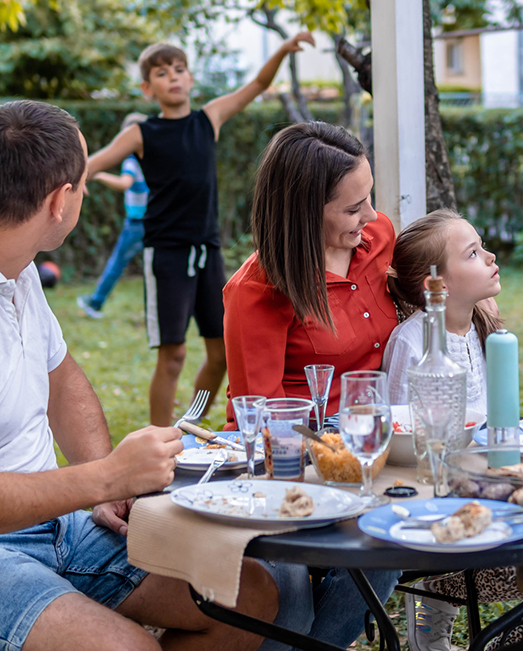Community
Copyright@ Australian Catholic University 1998-2026 | ABN 15 050 192 660 CRICOS registered provider: 00004G | PRV12008
Copyright@ Australian Catholic University 1998-2026 | ABN 15 050 192 660 CRICOS registered provider: 00004G | PRV12008

Picture this: You’re at home with your family but in work mode, with the laptop up and a dozen tabs open, occasionally checking your phone to see if any texts have come through, getting distracted by social media, scrolling until you look up and realise that you’re standing in the kitchen and other family members are scattered around you – leaning on the bench, peering in the fridge, sitting on the couch – all physically present, but not connected.
With busy lifestyles, rapidly declining youth mental health, and a society-wide inclination towards adolescent independence, parents and caregivers face an uphill battle to maintain close relationships with their teenage children.
Research has clearly established that family connectedness – a sense of belonging and a feeling of being loved, cared for, valued, and respected by family members – can serve as a safety net, fostering wellbeing and protecting the mental health of young people. And yet, in modern-day life, there are many impediments to achieving the open communication, quality time and shared experiences that characterise this sense of connection.
“The biggest hurdle is how busy people are, and that can be both young people and adults,” says Dr Elise Woodman, a social work lecturer and researcher at ACU’s School of Allied Health.
“We all know of the ways that technology has blurred the boundaries of both work and home, and school and home, and that has made it harder to carve out that time and say, ‘I’m at home now and I want to engage with the people who are here in front of me.’ If you add to that the other stresses that are often in the background, it can be extremely difficult to be fully present while at home.”
In a study published in the British Journal of Social Work in 2018, Dr Woodman and fellow ACU academic Professor Morag McArthur explored how young people experience family connectedness. The research involved 31 Canberra teenagers asked a series of questions about the nature of family relationships, and the things that helped them to feel connected.
While society often points the finger at teenagers for being distant and preferring to spend time alone or with friends, Dr Woodman found they greatly valued their family relationships, in many cases wanting more time with their parents and siblings.
“Even if they’re sometimes saying, ‘Drop me off further down the street so people don’t see me with you’ or ‘I’m going off to my room’, there tends to be this underlying desire for teens to stay connected with family,” says Dr Woodman, who completed her PhD on family connectedness at ACU’s Institute of Child Protection Studies in 2015.
“It gives young people a sense of belonging and a kind of security blanket or a buffer for the stresses and strains they typically experience during adolescence.”
One of the study participants, a teenager named Lily (not her real name), explained how feeling connected with family made it easier to take on challenges away from home.
“You’ve got this confidence that your family gives you, saying how much they love you and then you’re like, ‘Okay, I’m loved. I can go out into the world feeling loved right now and feel good about [myself]’,” Lily told the researchers. “It really helps that you’ve got this love nest around you. It just makes you into a better person and you [are] just happy and healthy within yourself.”
The teenage aloofness and irritability that is commonly dismissed as hormonal often obscures an underlying need for more connection, Dr Woodman says. She points to similar research showing that young people still want family involvement, even when they send mixed messages.
“It’s really easy to respond to that type of behaviour with a thought that, ‘Oh, they’re just being moody teenagers,’ but often they’re trying to give you feedback about what they’re experiencing at home,” she says. “They might actually be saying that they want your full attention and involvement, that they need more connection.”
Elise Woodman’s interest in young people’s wellbeing stems from her work as a school counsellor over a period of almost a decade. During this time, she observed that young people with healthy home environments found it easier to cope with the changes and challenges of adolescence.
“If, for example, relationships with peers at school aren’t going well, and if the kids at school are really excluding you and causing you stress, you still have a home environment that challenges that narrative,” she says. “Your family members are telling you that you’re worthwhile, and you can have a conversation about your relationships at school, what’s going wrong and how you might deal with it.”
While her initial research aimed to capture the voices of adolescents and their experiences of family connectedness, more recently she has built on that to provide practical and evidence-based support for those who work closely with young people.
Using both her theoretical knowledge and her practical experience as a social worker, Dr Woodman developed the Family Connectedness Practice Tool, a resource aimed at providing insights into how family connectedness can be supported in adolescence.
When the tool was first trialled with social workers in a pilot study between July 2019 and February 2020, it was found to be effective in “assessing, discussing and working towards family connectedness”. It has since been developed further to enhance cultural inclusivity and accessibility, while also allowing for more nuance to deal with the complexity of family relationships
“One of the things that I’m really passionate about with the tool is not suggesting that family connectedness has to look a particular way,” says Dr Woodman, who is currently working closely with youth advisory groups to review and improve the latest iteration of the tool.
“That means we’re really making sure that young people are defining who their family is, and we’re allowing the young person that freedom to say, ‘Well yeah, this bit here reflects my reality, but this bit here doesn’t.”
The tool includes a series of cards to help explore family connectedness with young people, and a family connectedness map with five overarching themes that support its development, including “being present and engaged”, “having things in common”, and “connections over time”.
Dr Woodman’s research has largely focused on teenagers, but she says the foundations for family connectedness are commonly built at a younger age. While young people desire greater independence as they mature, the continued importance of families in their lives should not be forgotten.
“With my early research, I was mostly speaking with young people who did feel that sense of family connectedness, and lots of those young people said to me, ‘Most of the stuff that has led to this connection has happened for as long as I can remember’,” she says.
“I think that shows how important it is to build the foundations that set up a strong relationship with your children – spending time together, being interested, being respectful – that should all happen when they’re kids anyway, and then as they grow and extend their networks, it’s about finding a balance that allows the young person some freedom and independence from family, while maintaining relationships, maintaining connections and maintaining fair boundaries.”
Parenting teenagers can seem like a daunting task, even for those families who have managed to forge a path to family connectedness.
But what happens when things go off track? What happens when your sense of connection with your adolescent child feels lost?
“As humans, we seek belonging and connection, and the desire to connect with family is pretty persistent,” says Dr Woodman, who recently offered tips to parents in an article on The Conversation. “New efforts from adults to connect with young people are usually received pretty positively, and teenagers tend to remain very resilient and open to the opportunities to reconnect with those adults.”
Even when life gets busy, the young people in your life need to know you value time with them and want more of it, Dr Woodman says. At the same time, she urges parents and caregivers to be kind to themselves. They’re not solely responsible for fostering family connection: the young people themselves, and other family members, also play an important role.
“There are many relationships within families and within extended support networks that can provide that sense of security, support, respect, belonging and closeness that young people need and desire,” Dr Woodman says, while also stressing that the thorny task of parenting teenagers is only a moment in time.
“Just like the younger stages of infancy and childhood, this too shall pass. As teenagers move towards adulthood, most young people will become clearer and more expressive about how they value you and your relationship.”
Dr Elise Woodman is a social work lecturer and researcher at ACU’s Canberra Campus. She is an experienced social work practitioner, researcher and academic with a focus on youth mental health, family connectedness, children’s participation, and evidence-informed practice.

Interested in social work? Explore our courses.
Copyright@ Australian Catholic University 1998-2026 | ABN 15 050 192 660 CRICOS registered provider: 00004G | PRV12008